#Letter to a Christian Nation
Text
According to a recent Gallup poll, only 12 percent of Americans believe that life on earth has evolved through a natural process, without the interference of a deity. Thirty one percent believe that evolution has been "guided by God." If our worldview were put to a vote, notions of "intelligent design" would defeat the science of biology by nearly three to one. This is troubling, as nature offers no compelling evidence for an intelligent designer and countless examples of unintelligent design. But the current controversy over "intelligent design" should not blind us to the true scope of our religious bewilderment at the dawn of the twenty first century. The same Gallup poll revealed that 53 percent of Americans are actually creationists.
This means that despite a full century of scientific insights attesting to the antiquity of life and the greater antiquity of the earth, more than half of our neighbors believe that the entire cosmos was created six thousand years ago. This is, incidentally, about a thousand years after the Sumerians invented glue. Those with the power to elect our presidents and congressmen - and many who themselves get elected—believe that dinosaurs lived two by two upon Noah's ark, that light from distant galaxies was created en route to the earth, and that the first members of our species were fashioned out of dirt and divine breath, in a garden with a talking snake, by the hand of an invisible God.
Among developed nations, America stands alone in these convictions. Our country now appears, as at no other time in her history, like a lumbering, bellicose, dimwitted giant. Anyone who cares about the fate of civilization would do well to recognize that the combination of great power and great stupidity is simply terrifying, even to one's friends. The truth, however, is that many of us may not care about the fate of civilization. Forty four percent of the American population is convinced that Jesus will return to judge the living and the dead sometime in the next fifty years. According to the most common interpretation of biblical prophecy, Jesus will return only after things have gone horribly awry here on earth. It is, therefore, not an exaggeration to say that if the city of New York were suddenly replaced by a ball of fire, some significant percentage of the American population would see a silver lining in the subsequent mushroom cloud, as it would suggest to them that the best thing that is ever going to happen was about to happen: the return of Christ. It should be blindingly obvious that beliefs of this sort will do little to help us create a durable future for ourselves—socially, economically, environmentally, or geopolitically. Imagine the consequences if any significant component of the U.S. government actually believed that the world was about to end and that its ending would be glorious. The fact that nearly half of the American population apparently believes this, purely on the basis of religious dogma, should be considered a moral and intellectual emergency.
-- Sam Harris, “Letter to a Christian Nation” (2006)
#Sam Harris#Letter to a Christian Nation#christianity#evolution deniers#evolution denial#creationism#apocalypse cult#apocalypse#return of jesus#return of jesus christ#second coming#second coming of jesus christ#end of the world#end of days#end times#end days#judgment day#judgement day#religion#religion is a mental illness
53 notes
·
View notes
Text
there's a podcast i like thats focused on leftist theory through a christian lens (which i just think is really interesting, given how many christians you meet that are loudly anti-communist and for some reason are convinced jesus would love capitalism) and i just saw a tweet thread they made saying that, for Lent, they want to give up the US blockade against Cuba (so theyre spending the next 40 days writing letters to biden and their local reps and encouraging others to do the same)
i am delighted i bought all those stamps at costco because i am gonna be writing some goddamn letters to our dumbfuck government
#anime life#they shared a google doc they wrote about how to write the letters and some ideas of what to say#my local rep is verrrrry conservative and '''''christian'''''#and in the google doc they pointed out that the past 3 popes and the world council of churches#have all called for the US to end the embargo#do i think this will get through to cathy mcmorris rogers?? no because she has brain worms#but i still think it'll be fun for me to insist that my gay trans ass is better at being christian than her#when im an atheist#anyway if anyone wants the google doc or the zine these guys made abt christian solidarity w cuba#i can share#but like. obviously theyre very christian lmao#again i am an atheist but being raised catholic in a very fundamentalist christian nation#i think hearing christian arguments against capitalism and for. things that are generally good. is really interesting and illuminating
53 notes
·
View notes
Text

LETTERS FROM AN AMERICAN
October 29, 2023
HEATHER COX RICHARDSON
OCT 30, 2023
On October 29, 1929, the U.S. stock market crashed. It had been rocked five days before, when heavy trading early in the day drove it down, but leading bankers had seen the mounting crisis and moved in to stabilize the markets before the end of the day. October 24 left small investors broken but the system intact. On Monday, October 28, the market slid again, with a key industrial average dropping 49 points.
And then, on October 29, the crisis hit. When the gong in the great hall of the New York Stock Exchange hit at ten o’clock, the market opened with heavy trading, all of it downward. When the ticker tape finally showed the day’s transactions, two and a half hours later, it documented that more than 16 million shares had changed hands and the industrial average had dropped another 43 points.
Black Tuesday was the beginning of the end. The market continued to drop. By November the industrial average stood at half of what it had been two months before. By 1932, manufacturing output was less than it had been in 1913; foreign trade plummeted from $10 billion to $3 billion in the three years after 1929, and agricultural prices fell by more than half. By 1932 a million people in New York City were out of work; by 1933, thirteen million people—one person of every four in the labor force—were unemployed. Unable to pay rent or mortgages, people lived in shelters made of packing boxes.
While the administration of Republican president Herbert Hoover preached that Americans could combat the Depression with thrift, morality, and individualism, voters looked carefully at the businessmen who only years before had seemed to be pillars of society and saw they had plundered ordinary Americans. The business boom of the 1920s had increased worker productivity by about 43%, but wages did not rise. Those profits, along with tax cuts and stock market dividends, meant that wealth moved upward: in 1929, 5% of the population received one third of the nation’s income.
In 1932, nearly 58% of voters turned to Democratic president Franklin Delano Roosevelt, who promised them a “New Deal”: a government that would work for everyone, not just for the wealthy and well connected.
As soon as Roosevelt was in office, Democrats began to pass laws protecting workers’ rights, providing government jobs, regulating business and banking, and beginning to chip away at the racial segregation of the American South. New Deal policies employed more than 8.5 million people, built more than 650,000 miles of highways, built or repaired more than 120,000 bridges, and put up more than 125,000 buildings. They regulated banking and the stock market and gave workers the right to bargain collectively. They established minimum wages and maximum hours for work. They provided a basic social safety net and regulated food and drug safety.
When he took office in 1953, Republican Dwight D. Eisenhower built on this system, adding to the nation’s infrastructure with the Federal-Aid Highway Act, which provided $25 billion to build 41,000 miles of highway across the country; adding the Department of Health, Education, and Welfare to the government and calling for a national healthcare system; and nominating former Republican governor of California Earl Warren as chief justice of the Supreme Court to protect civil rights. Eisenhower also insisted on the vital importance of the North Atlantic Treaty Organization (NATO) to stop the Soviet Union from spreading communism throughout Europe.
Eisenhower called his vision “a middle way between untrammeled freedom of the individual and the demands of the welfare of the whole Nation.” The system worked: between 1945 and 1960 the nation’s gross national product (GNP) jumped by 250%, from $200 billion to $500 billion.
But while the vast majority of Americans of both parties liked the new system that had helped the nation to recover from the Depression and to equip the Allies to win World War II, a group of Republican businessmen and their libertarian allies at places like the National Association of Manufacturers insisted that the system proved both parties had been corrupted by communism. They inundated newspapers, radio, and magazines with the message that the government must stay out of the economy to return the nation to the policies of the 1920s.
Their position got little traction until the Supreme Court’s 1954 Brown v. Board of Education decision declaring segregation in public schools unconstitutional. That decision enabled them to divide the American people by insisting that the popular new government simply redistributed tax dollars from hardworking white taxpayers to undeserving minorities.
A promise to cut the taxes that funded social services and the business regulations they insisted hampered business growth fueled the election of Ronald Reagan for president in 1980. But by 1986 administration officials recognized that tax cuts that were driving the deficit up despite dramatic cuts to social services were so unpopular that they needed footsoldiers to back businessmen. So, Reagan backed the creation of an organization that brought together big businessmen, evangelical Christians, and social conservatives behind his agenda. “Traditional Republican business groups can provide the resources,” leader of Americans for Tax Reform Grover Norquist explained, “but these groups can provide the votes.”
By 1989, Norquist’s friend Ralph Reed turned evangelical Christians into a permanent political pressure group. The Christian Coalition rallied evangelicals behind the Republican Party, calling for the dismantling of the post–World War II government services and protections for civil rights—including abortion—they disliked.
As Republicans could reliably turn out religious voters over abortion, that evangelical base has become more and more important to the Republican Party. Now it has put one of its own in the House Speaker’s chair, just two places from the presidency. On October 25, after three weeks of being unable to unite behind a speaker after extremists tossed out Kevin McCarthy (R-CA), the Republican conference coalesced behind Representative Mike Johnson (R-LA) in part because he was obscure enough to have avoided scrutiny.
Since then, his past has been unearthed, showing interviews in which he asserted that we do not live in a democracy but in a “Biblical republic.” He told a Fox News Channel interviewer that to discover his worldview, one simply had to “go pick up a Bible off your shelf and read it. That’s my worldview.”
Johnson is staunchly against abortion rights and gay rights, including same-sex marriage, and says that immigration is “the true existential threat to the country.” In a 2016 sermon he warned that the 1960s and 1970s undermined “the foundations of religion and morality in the U.S.” and that attempts to address climate change, for example, are an attempt to destroy capitalism.
Like other adherents of Christian nationalism, Johnson appears to reject the central premise of democracy: that we have a right to be treated equally before the law. And while his wife, Kelly, noted last year on a podcast that only about 4% of Americans “still adhere to a Biblical worldview,” they appear to reject the idea we have the right to a say in our government. In 2021, Johnson was a key player in the congressional attempt to overturn the lawful results of the 2020 presidential election.
In his rejection of democracy, Johnson echoes authoritarian leaders like Russia’s Vladimir Putin and Hungary’s Viktor Orbán, both of whom have the loyal support of America’s far right. Such leaders claim that the multiculturalism at the heart of democracy ruins nations. The welcoming of various races and ethnicities through immigration or affirmative action undermines national purity, they say, while the equality of LGBTQ+ individuals and women undermines morality. Johnson has direct ties to these regimes: his 2018 campaign accepted money from a group of Russian nationals, and he has said he does not support additional funding for Ukraine in its fight against Russian aggression.
The rejection of democracy in favor of Christian authoritarianism at the highest levels of our government is an astonishing outcome of the attempt to prevent another Great Depression by creating a government that worked for ordinary Americans rather than a few wealthy men.
But here we are.
After Johnson’s election as speaker, extremist Republican Matt Gaetz of Florida spelled out what it meant for the party…and for the country: “MAGA is ascendant,” Gaetz told former Trump advisor Steve Bannon, “and if you don’t think that moving from Kevin McCarthy to MAGA Mike Johnson shows the ascendance of this movement, and where the power of the Republican Party truly lies, then you’re not paying attention.”
—
LETTERS FROM AN AMERICAN
HEATHER COX RICHARDSON
#Heather Cox Richardson#Letters From An American#MAGA#history#racism#Christian Authoritarianism#Christian Dominionism#Christian Nationalism#Biblical Republic
5 notes
·
View notes
Text

By Kitty Werthmann
“I am a witness to history.
“I cannot tell you that Hitler took Austria by tanks and guns; it would distort history.
If you remember the plot of the Sound of Music, the Von Trapp family escaped over the Alps rather than submit to the Nazis. Kitty wasn’t so lucky. Her family chose to stay in her native Austria. She was 10 years old, but bright and aware. And she was watching.
“We elected him by a landslide – 98 percent of the vote,” she recalls.
She wasn’t old enough to vote in 1938 – approaching her 11th birthday. But she remembers.
“Everyone thinks that Hitler just rolled in with his tanks and took Austria by force.”
No so.
Hitler is welcomed to Austria
“In 1938, Austria was in deep Depression. Nearly one-third of our workforce was unemployed. We had 25 percent inflation and 25 percent bank loan interest rates.
Farmers and business people were declaring bankruptcy daily. Young people were going from house to house begging for food. Not that they didn’t want to work; there simply weren’t any jobs.
“My mother was a Christian woman and believed in helping people in need. Every day we cooked a big kettle of soup and baked bread to feed those poor, hungry people – about 30 daily.’
“We looked to our neighbor on the north, Germany, where Hitler had been in power since 1933.” she recalls. “We had been told that they didn’t have unemployment or crime, and they had a high standard of living.
“Nothing was ever said about persecution of any group – Jewish or otherwise. We were led to believe that everyone in Germany was happy. We wanted the same way of life in Austria. We were promised that a vote for Hitler would mean the end of unemployment and help for the family. Hitler also said that businesses would be assisted, and farmers would get their farms back.
“Ninety-eight percent of the population voted to annex Austria to Germany and have Hitler for our ruler.
“We were overjoyed,” remembers Kitty, “and for three days we danced in the streets and had candlelight parades. The new government opened up big field kitchens and
everyone was fed.
“After the election, German officials were appointed, and, like a miracle, we suddenly had law and order. Three or four weeks later, everyone was employed. The government made sure that a lot of work was created through the Public Work Service.
“Hitler decided we should have equal rights for women. Before this, it was a custom that married Austrian women did not work outside the home. An able-bodied husband would be looked down on if he couldn’t support his family. Many women in the teaching profession were elated that they could retain the jobs they previously had been re- quired to give up for marriage.
“Then we lost religious education for kids
“Our education was nationalized. I attended a very good public school.. The population was predominantly Catholic, so we had religion in our schools. The day we elected Hitler (March 13, 1938), I walked into my schoolroom to find the crucifix replaced by Hitler’s picture hanging next to a Nazi flag. Our teacher, a very devout woman, stood up and told the class we wouldn’t pray or have religion anymore. Instead, we sang ‘Deutschland, Deutschland, Uber Alles,’ and had physical education.
“Sunday became National Youth Day with compulsory attendance. Parents were not pleased about the sudden change in curriculum. They were told that if they did not send us, they would receive a stiff letter of warning the first time. The second time they would be fined the equivalent of $300, and the third time they would be subject to jail.”
And then things got worse.
“The first two hours consisted of political indoctrination. The rest of the day we had sports. As time went along, we loved it. Oh, we had so much fun and got our sports equipment free.
“We would go home and gleefully tell our parents about the wonderful time we had.
“My mother was very unhappy,” remembers Kitty. “When the next term started, she took me out of public school and put me in a convent. I told her she couldn’t do that and she told me that someday when I grew up, I would be grateful. There was a very good curriculum, but hardly any fun – no sports, and no political indoctrination.
“I hated it at first but felt I could tolerate it. Every once in a while, on holidays, I went home. I would go back to my old friends and ask what was going on and what they were doing.
“Their loose lifestyle was very alarming to me. They lived without religion. By that time, unwed mothers were glorified for having a baby for Hitler.
“It seemed strange to me that our society changed so suddenly. As time went along, I realized what a great deed my mother did so that I wasn’t exposed to that kind of humanistic philosophy.
“In 1939, the war started, and a food bank was established. All food was rationed and could only be purchased using food stamps. At the same time, a full-employment law was passed which meant if you didn’t work, you didn’t get a ration card, and, if you didn’t have a card, you starved to death.
“Women who stayed home to raise their families didn’t have any marketable skills and often had to take jobs more suited for men.
“Soon after this, the draft was implemented.
“It was compulsory for young people, male and female, to give one year to the labor corps,” remembers Kitty. “During the day, the girls worked on the farms, and at night they returned to their barracks for military training just like the boys.
“They were trained to be anti-aircraft gunners and participated in the signal corps. After the labor corps, they were not discharged but were used in the front lines.
“When I go back to Austria to visit my family and friends, most of these women are emotional cripples because they just were not equipped to handle the horrors of combat.
“Three months before I turned 18, I was severely injured in an air raid attack. I nearly had a leg amputated, so I was spared having to go into the labor corps and into military service.
“When the mothers had to go out into the work force, the government immediately established child care centers.
“You could take your children ages four weeks old to school age and leave them there around-the-clock, seven days a week, under the total care of the government.
“The state raised a whole generation of children. There were no motherly women to take care of the children, just people highly trained in child psychology. By this time, no one talked about equal rights. We knew we had been had.
“Before Hitler, we had very good medical care. Many American doctors trained at the University of Vienna..
“After Hitler, health care was socialized, free for everyone. Doctors were salaried by the government. The problem was, since it was free, the people were going to the doctors for everything.
“When the good doctor arrived at his office at 8 a.m., 40 people were already waiting and, at the same time, the hospitals were full.
“If you needed elective surgery, you had to wait a year or two for your turn. There was no money for research as it was poured into socialized medicine. Research at the medical schools literally stopped, so the best doctors left Austria and emigrated to other countries.
“As for healthcare, our tax rates went up to 80 percent of our income. Newlyweds immediately received a $1,000 loan from the government to establish a household. We had big programs for families.
“All day care and education were free. High schools were taken over by the government and college tuition was subsidized. Everyone was entitled to free handouts, such as food stamps, clothing, and housing.
“We had another agency designed to monitor business. My brother-in-law owned a restaurant that had square tables.
“Government officials told him he had to replace them with round tables because people might bump themselves on the corners. Then they said he had to have additional bathroom facilities. It was just a small dairy business with a snack bar. He couldn’t meet all the demands.
“Soon, he went out of business. If the government owned the large businesses and not many small ones existed, it could be in control.
“We had consumer protection, too
“We were told how to shop and what to buy. Free enterprise was essentially abolished. We had a planning agency specially designed for farmers. The agents would go to the farms, count the livestock, and then tell the farmers what to produce, and how to produce it.
“In 1944, I was a student teacher in a small village in the Alps. The villagers were surrounded by mountain passes which, in the winter, were closed off with snow, causing people to be isolated.
“So people intermarried and offspring were sometimes retarded. When I arrived, I was told there were 15 mentally retarded adults, but they were all useful and did good manual work.
“I knew one, named Vincent, very well. He was a janitor of the school. One day I looked out the window and saw Vincent and others getting into a van.
“I asked my superior where they were going. She said to an institution where the State Health Department would teach them a trade, and to read and write. The families were required to sign papers with a little clause that they could not visit for 6 months.
“They were told visits would interfere with the program and might cause homesickness.
“As time passed, letters started to dribble back saying these people died a natural, merciful death. The villagers were not fooled. We suspected what was happening. Those people left in excellent physical health and all died within 6 months. We called this euthanasia.
“Next came gun registration. People were getting injured by guns. Hitler said that the real way to catch criminals (we still had a few) was by matching serial numbers on guns. Most citizens were law-abiding and dutifully marched to the police station to register their firearms. Not long afterwards, the police said that it was best for everyone to turn in their guns. The authorities already knew who had them, so it was futile not to comply voluntarily.
“No more freedom of speech. Anyone who said something against the government was taken away. We knew many people who were arrested, not only Jews, but also priests and ministers who spoke up.
“Totalitarianism didn’t come quickly, it took 5 years from 1938 until 1943, to realize full dictatorship in Austria. Had it happened overnight, my countrymen would have fought to the last breath. Instead, we had creeping gradualism. Now, our only weapons were broom handles. The whole idea sounds almost unbelievable that the state, little by little eroded our freedom.”
“This is my eyewitness account.
“It’s true. Those of us who sailed past the Statue of Liberty came to a country of unbelievable freedom and opportunity.
“America is truly is the greatest country in the world. “Don’t let freedom slip away.
“After America, there is no place to go.”
Kitty Werthmann
2K notes
·
View notes
Note
A big thanks to you and your team for making Pentiment, it's an amazing game and it'll be with me for a long time I think, especially the personal and emotional character writing.
I'm curious about what was the inspiration behind, and creative motivation for including, the motif of the labyrinth. The church's painting of the Virgin Mary with the labyrinth seems striking in particular, especially because I don't remember ever coming across a strong association with labyrinths in Christian imagery.
Thank you. I'm glad it was so impactful.
Labyrinths have a long association with Christianity going back to the 4th century, when one was placed in a cathedral in Chlef (now in Algeria). This is known as the St. Reparata or St. Reparatus Labyrinth.

The Chartres Labyrinth was built around 1200.

Christian labyrinths are meant to be walked while contemplating. The path twists and turns, but there is only one way to go. They also all clearly take inspiration from labyrinths of the classical world even if their purpose and origins are effectively lost to those who see them.
As Beatrice says to Andreas (paraphrased), the foundations of our memories become buried and invisible. And she is paraphrasing and abbreviating Plato speaking to Solon in Timaeus,
whatever happened either in your country or in ours, or in any other region of which we are informed-if there were any actions noble or great or in any other way remarkable, they have all been written down by us of old, and are preserved in our temples. Whereas just when you and other nations are beginning to be provided with letters and the other requisites of civilized life, after the usual interval, the stream from heaven, like a pestilence, comes pouring down, and leaves only those of you who are destitute of letters and education; and so you have to begin all over again like children, and know nothing of what happened in ancient times, either among us or among yourselves. As for those genealogies of yours which you just now recounted to us, Solon, they are no better than the tales of children. In the first place you remember a single deluge only, but there were many previous ones;
I also wanted the association with the labyrinth from The Name of the Rose, which in turn was inspired by the Reims Labyrinth.
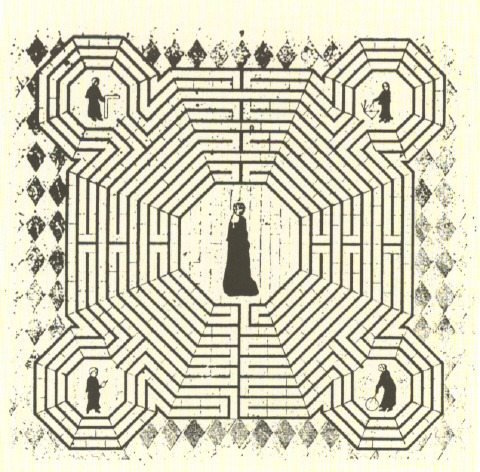
The Reims Labyrinth was constructed in the late 13th century but was destroyed in the 18th century by superstitious priests. It was through the discovery of drawings that modern scholars were able to recreate and project the path of the labyrinth onto the cathedral floor.

The cover of the 1st Italian edition (and therefore, first edition overall) of Il Nome della Rosa prominently incorporated the drawing of the Reims Labyrinth.

Note the map of the Aedificium:

The final lines of The Name of the Rose are:
Stat rosa pristina nomine, nomina nuda tenemus.
The original rose remains only in name, we hold those names stripped.
This refers to a specific object in the story, but more broadly symbolizes historical records, art objects, and other artifacts lost to time. The Reims Labyrinth remains only in drawings, stories, and light projected on the ground where it once stood; the labyrinth itself was destroyed.
Nomen est; res non est. - The name exists; the thing does not.
As a side note, France uses the Reims Labyrinth as its symbol for historical monuments - an important reminder of how fragile their existence can be.

1K notes
·
View notes
Text
Some tangible Black queer history for you!
In case you needed any more proof that we've always been here - this amazing collection is courtesy of the Stonewall National Musuem and Archive!

Rafiki: The Journal of the Association of Black Gays, Vol. 1 #1 (Fall 1976)
"Rafiki was a quarterly publication from the Association of Black Gays (ABG), a Los Angeles, California gay activist group that organized through education, political engagement, and grassroots activism to
improve the conditions for Los Angeles’s Black gays and lesbians.
According to the journal, the title Rafiki was chosen because it means “friend” in Swahili and “that’s what [ABG] hope to be for you.” This first issue includes an article on the history of ABG and the fact that Black gays and lesbians have been largely excluded from the political, social, and economic advances of the gay community.
Included in this issue are articles such as “Homosexuality in Tribal Africa” and “Disco Discontent” (an open letter to the owner of Studio One, Scott Forbes), as well as poetry by Steven Corbin and Frances Andrews, and book reviews. It even contains an ad for the famous Catch One Club owned by Jewel Williams, which is still
operating today!"
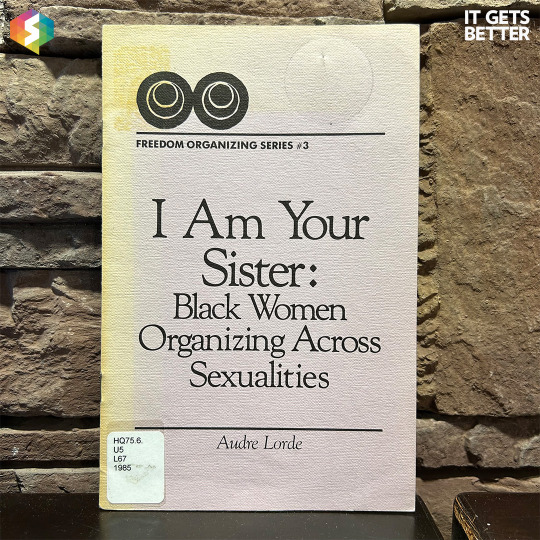
I Am Your Sister: Black Women Organizing Across Sexualities by Audre Lorde (Kitchen Table: Women of Color Press, 1985; from the Freedom Organizing Series)
You can read this one here!
"This small twelve-page publication derives from a speech Audre Lorde gave at the Women’s Center of Medgar Evers College in New York City regarding the exclusion of Lesbians in the feminist movement and how Lorde’s identity as both a Black woman and lesbian are inextricably linked.
Primarily, heterosexism and homophobia are major issues Lorde states are “two grave barriers to organizing among Black women.” Lorde ends the essay with the statement: “I am a Black Lesbian, and I am your sister.”
Her emphasis on the duality of this identity stems from a 1960s poster that said “He’s not black, he’s my brother!,” which Lorde states infuriated her because “it implied that the two were mutually
exclusive.”
Kitchen Table: Women of Color Press was founded by Barbara Smith—another Black Lesbian feminist—and Audre Lorde in 1980 to create a publishing apparatus for women of color who at the time did not have control over how they were published except through the white-dominated outlets."
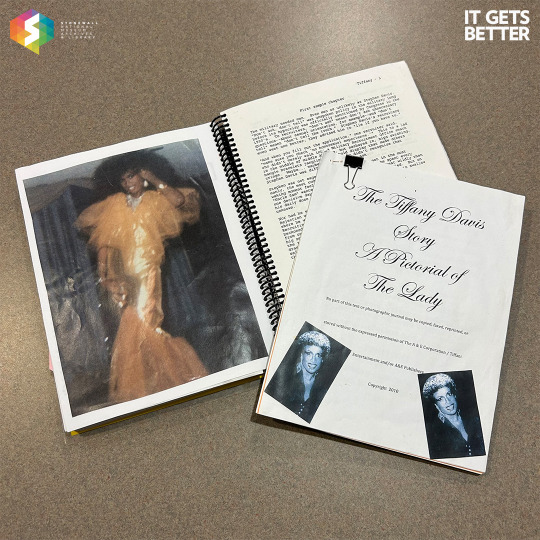
Flawless! The Life & Times of T.B.D.J. AKA Tiffani Inc. AKA Mrs. … (Manuscript) by Tiffany Bowerman (July 2007, A&E Publishers)
This autobiographical manuscript traces the life of Tiffany Bowerman aka Tiffany B.D. Johnson (b. 1959), who states that she “was the first African-American Transsexual to have state issued birth certificate reissued [1990]… was the first to legally marry three different active duty military men… [and] first… to found their own Christian Denomination… The Agape-Ecumenical Christian Denomination.”
Further, she states “I have tried to put together something striking and original[,] a journey from childhood to self aware adult. A life that was and is with all regrets included.”
This manuscript is a preliminary copy of a rough draft, and contains various memoirs, photographs, legal documents, and ephemera.
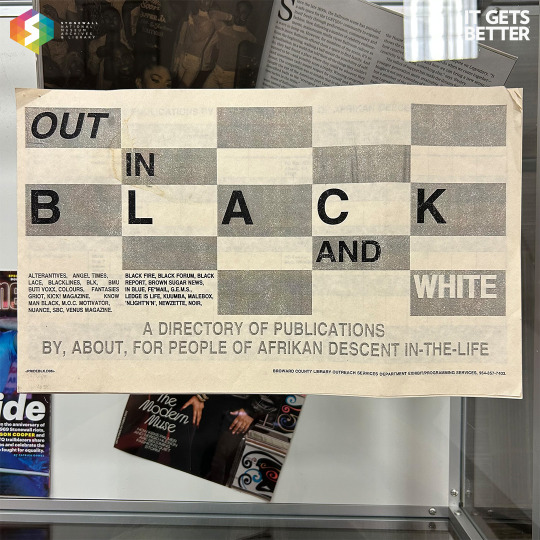
Out in Black and White: A Directory of Publications By, About, For People of Afrikan Descent In-The-Life by the Broward County Library Outreach Services Department Exhibit/Programming Services with direction by Eric Jon Rawlins (January, 1996)
Out in Black and White is a directory of various serial publications (magazines, newsletters, journals, etc.) throughout the United States that are focused on the Black LGBTQ experience. According to the directory, “[t]his project was inspired by the atmosphere of strength, oneness and productivity created by the Million Man March [on October 16,] 1995.”
The Million Man March was a political demonstration that took place at the National Mall in Washington, D.C. with the purpose of encouraging involvement in the improvement of the conditions of African Americans. Eric Jon Rawlins was a Broward County, Florida librarian who at one time was also the second vice president of the NAACP Fort Lauderdale branch in the late 1980s.
Currently, the Eric Jon Rawlins Collection consisting of personal and professional papers, as well as his 6,000 vinyl record album collection, are housed at the African American Research Library and Cultural Center Special Collections in Broward County, FL.
#it gets better#black history month#bhm#black trans lives matter#lgbtqia#queer history#lgbtq history#black history#queer archive#queer lit#studyblr
103 notes
·
View notes
Text

The phrase many Americans use to describe religious freedom, “separation of church and state” is not found in either the Constitution or the Bill of Rights. In 1802 Thomas Jefferson wrote a letter to the Danbury, Connecticut Baptist Convention in which he presented his views on the relationship between religion and the role of the state in the new nation. Basing his views on the establishment clause of the First Amendment which said that there should be “no law respecting the establishment of religion or prohibiting the free exercise thereof,” Jefferson stated that there must be a “wall of separation” that clearly limited the involvement of religious denominations and religious leaders in matters related to
national governance.
Jefferson, like many other of the early leaders of the United States, was committed to what is commonly called a secular state, in which citizens can openly hold religious beliefs and participate in religious services, but not seek to influence the direction of the state on matters of national policy. It is important to note that the words God, Jesus, and Christianity are not mentioned in the Constitution as evidence that the writers of this basic governing document wanted to put up a strong wall of separation.
151 notes
·
View notes
Text
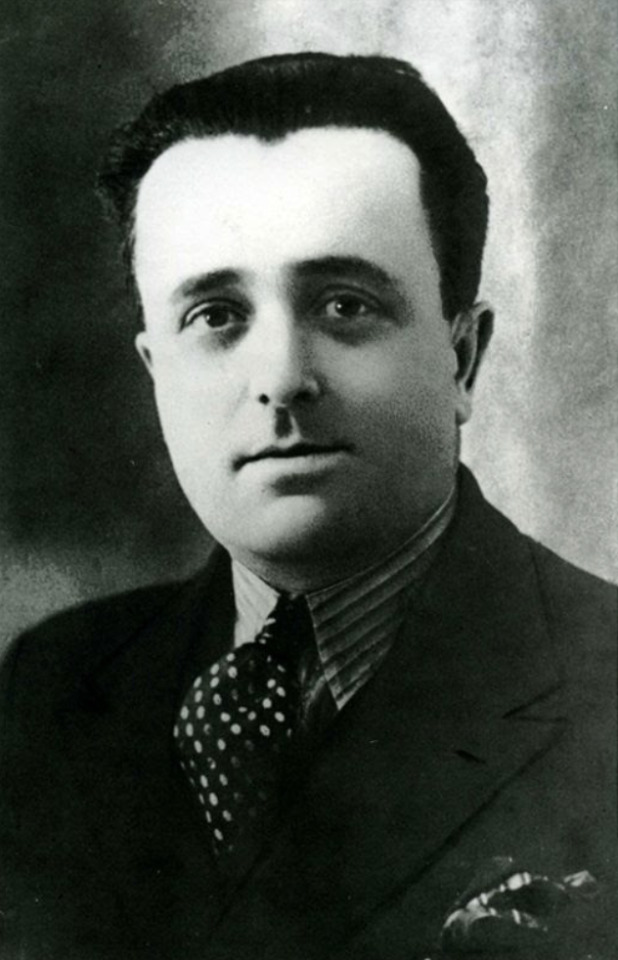
THURSDAY HERO:
Odoardo Focherini
Odoardo Focherini was an Italian journalist and devout Catholic who rescued 105 Jews between 1942 and 1944 by obtaining false identity papers for them and transporting them to safety in Switzerland. He was posthumously beatified by Pope Benedict XVI.
Odoardo, known as “Odo,” was born in Modena, Italy in 1907 to a devout Catholic family. At a vacation in Trento in 1925, he met Maria Marchesi, and they fell in love and soon became engaged. Odo was 18 and Maria was 16, so they waited until 1930 to get married. They had seven children.
Odo worked as an insurance agent, but in 1933 he followed his passion and started a new career as a journalist. He became managing director of L’Avvenire d’Italia, a daily newspaper affiliated with the Catholic Church that is still being published today. Odo was such an exceptional journalist that he came to the attention of the highest levels of the Catholic Church, and Pope Pius XI awarded him the Order of Saint Sylvester in 1937.
The situation in Europe grew increasingly darker for the Jews and in 1942, Hitler enacted the genocidal “Final Solution.” Cardinal Pietro Boetta, the archbishop of Genoa, asked the editor-in-chief of L’Avvenire d’Italia, Raimondo Manzini, to help a group of Polish Jews escape from fascist-ruled Italy to safety in Switzerland. Manzini immediately recruited Odo, known for his strong moral compass and devotion to justice, to carry out this lifesaving mission. Odo created a secret network of Catholics who wanted to help persecuted Jews as the Nazi death machine took over Europe. Using contacts he’d met during his work as a journalist, Odo procured a large number of false documents and personally accompanied many Jews over the border to Switzerland. Odo saved the lives of 105 Jews between 1942 and 1944.
Unfortunately, the Nazis found out what Odo was doing when they intercepted a letter in which he wrote that he was helping Jews “not for profit but out of pure Christian charity.” He was arrested by the Gestapo on March 11, 1944 and imprisoned in Bologna. That August Odo was transferred to a work camp in Germany. During his imprisonment Odo sent 166 letters to his beloved wife Maria. Later that year Odo was sent to a concentration camp in Hersbruck, Germany. He developed a leg infection which wasn’t treated and became gangrenous. On December 27, 1944, Odo died from the raging infection. His last words were, “I declare that I die in the purest Roman Catholic faith and in full submission to the will of God.”
Odo was posthumously awarded the title of Righteous Among the Nations by Israeli Holocaust Memorial Yad Vashem in 1969. In 1996, Pope John Paul II declared Odo a “Servant of God,” because he was murdered for saving Jews. This began the lengthy beatification process, and in 2012, the decree attesting to Focherini’s martyrdom was finally signed by Pope Benedict XVI. Odoardo Focherini was the first Righteous Gentile to be beatified. Odo’s letters to his family were published as a book in 1994. The Memorial Museum in Carpi displays a large banner with a quotation from Odo that he said to his brother-in-law who visited him in prison: “If you had seen, as I have seen in this prison, how Jews are treated here, your only regrets would be not to have saved more of them.”
For saving 105 Jews, at the cost of his own life, we honor Odoardo Focherini as this week’s Thursday Hero.
77 notes
·
View notes
Note
to BE dramatic: I want to get your Byron-Shelleys misconceptions posts tattooed, or at least printed to have as wallpaper in one of my apartment walls.
truly never getting over the amount of people on tumblr who are openly pursuing degrees in literature who believe in straight up false anecdotes about the creation of Frankenstein as a novel, out of sheer projection that maybe, by projecting into Mary Shelley, they too can fulfil whichever delusion they have, pretending fallacy of repulsion arguments and sentimentality account for proper literary analysis.
Mary Shelley's interpersonal relationships are never analysed with nuance and as just another influence into her writing, instead of them being an entire Confession of her character. And, even then, if they were a "Confession" (what a christian notion, that we must declare our most private thoughts and make them a static manifesto for others to judge and condemn) they'd still find a way to dismiss them because it would not fit what THEY want to hear.
And if any person who feels targeted by your post or this ask (if you decide to publish it, bc that's your call, I'm just talking) I invited them to read past Frankenstein. Not just past 1831 Frankenstein and into the 1818 edition, but read Matilda. Read the Last Man. Read her diaries and letters about Byron's death and how she was truly alone in the world (because no matter how insufferable someone thinks Byron to be, he was just like her in many ways, to their society). Read about her financial problems with Godwin. Read about Timothy Shelley's censorship, how he failed to show up to the reading of his son's testament and only agreed to anything if Mary relinquished the tuition of her ONLY living child with Percy and stopped writing. And yet, she did not fucking stop.
Also, if you wanna get really annoyed, idk if you know but there's a historical novel where the author writes Mary as the murderer of Harriet Shelley, and it is. Enraging.
One day Mary Shelley won't be a Harlot or a Victim but a literary genius with an unparalleled creative vision, surpassing the Big 6 of romanticism by far in topics, literary ethos and execution, and who, just like them, was also influenced by her time, her station, her connections, the private thoughts we will never know, her nationality, her race, and her historical context. All things which are worthy of analysing as part of the soup that makes her writing unique and valuable to the western literary canon, not as a condemnation, excuse, or second-thought
The world deserves to read this — yes, I agree with a lot of your points. I've made a lot of posts about these topics so I'm glad others agree!
#mary shelley#ask#asks#literature#english literature#percy shelley#harriet shelley#percy bysshe shelley
62 notes
·
View notes
Text
A college professor of “peace” accused of teaching support for Hamas has been suspended from his tenured post at an ultra-liberal school after allegations he once ran a sex-for-grades scheme came to light.
Iranian citizen Mohammad Jafer Mahallati — who has called for the elimination of Israel and backed the murderous fatwa against Salman Rushdie — was discreetly put on indefinite administrative leave by Oberlin College, Ohio, and scrubbed from its website last month after the administration learned he had previously been accused of sexual harassment.
The college is currently being investigated by the federal Department of Education after a complaint that it abused the civil rights of Jewish students by allegedly letting Mahallati speak in favor of Hamas and give credit for writing anti-Israel screeds.
The move by Oberlin to suspend Mahallati, 71, comes amid mounting fury at colleges’ failure to grapple with antisemitism in the wake of the October 7 massacre of 1,200 Israelis by terrorist group Hamas.
The presidents of Harvard and the University of Pennsylvania faced demands to resign from a billionaire donor Wednesday and criticism from the White House after telling Congress it “depends on the context” as to whether students could demand the genocide of Jews.
Mahallati’s suspension came after court papers surfaced from the 1990s which revealed that when he was an adjunct professor at Columbia University, he had been accused of giving a graduate student 11 years his junior good grades in return for sex.
The papers, given to The Post by Middle East Forum, showed that Columbia and Mahallati had both been sued by the woman, whom The Post is not naming, accusing him of working to damage her reputation and academic future after she reported his alleged sexual abuse to school authorities.
Mahallati had denied the claims in 1997 but did not respond to a request for comment from The Post. Columbia denied the allegations at the time.
The woman, then 32 and a Palestinian Christian, met Mahallati, a 43-year-old married father of a young son, when she began to minor in Middle East Studies in September1995, she alleged in court papers.
She alleged that under the pretense of interviewing her as a potential research assistant, Mahallati invited the student to his home, “made repeated sexual advances” and promised good grades in exchange for sexual encounters, which allegedly took place at his office as well as his Manhattan apartment for 15 months.
Mahallati allegedly told the woman that he would withhold her grade if she did not keep silent. She alleged that when she went to Columbia’s administration in April 1997 he accused her of handing the same paper in twice, which would have been fraudulent.
When she sued, court records show that he tried to claim diplomatic immunity with a Dec. 1, 1997, letter from Iran’s Permanent Mission to the United Nations appointing him “‘Special Advisor in Political Affairs’ with full diplomatic and political privileges.”
He had been Iran’s ambassador to the United Nations between 1987 and 1989 and Columbia submitted a letter from the State Department to prove he was not immune from being sued for what he was accused of doing after 1989. The case was settled in 1998.
Andrea Simakis, a spokeswoman for Oberlin, told The Post he was placed on leave on Nov. 28 and declined to comment further. It is unclear exactly when the college learned of the 1990s claims against Mahallati.
“We take all allegations of sexual harassment and abuse extremely seriously,” said Simakis. “We would not hire a faculty member who we knew to have a history of sexual harassment of a student, colleague or staff member.”
At Oberlin, Mahallati became the subject of a federal probe this fall when the Department of Education’s Office of Civil Rights revealed that it was investigating a complaint that he taught students “support for Hamas and terrorism” as part of a larger probe into anti-Semitism on Oberlin’s campus.
The probe, which was opened on September 29, was prompted by a complaint filed in 2019 by Oberlin College graduate Melissa Landa. Landa, who graduated from Oberlin in 1986, is president of the Oberlin Chapter of Alums for Campus Fairness, a non-profit that works to end antisemitism.
She sent the department a dossier of anti-Jewish and anti-Israel incidents between 2014 and 2017, including that Mahallati told his classes in 2016 that “Israel is a colonialist state” and “an apartheid state.”
Oberlin said in November that it “abhors antisemitism” and said of Mahallati: “Professor Mahallati has stated that he believes in the right of all people to exist in peace and endorses a two-state solution that would allow the people of Israel and Palestine to peacefully coexist.”
Separately, a group of Iranian anti-regime activists, some of whom have had family members targeted by the Islamic Republic, had also complained about Mahallait, accusing him of being part of a cover-up of a mass murder of 5,000 political prisoners in 1988 when he was Iran’s ambassador to the United Nations.
It said in a statement: “This action comes as a result of tireless advocacy and stark revelations about Mahallati’s involvement in covering up human rights abuses and his antisemitic rhetoric.”
In addition to Columbia and Oberlin, Mahallati has also taught at Georgetown and Princeton.
49 notes
·
View notes
Text


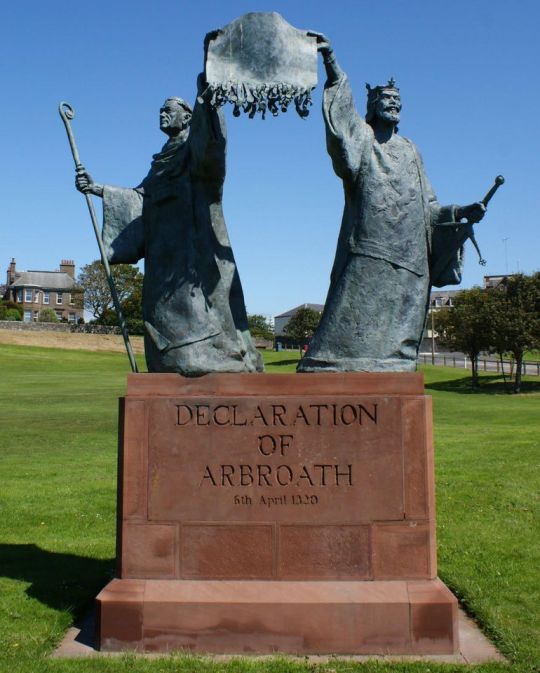

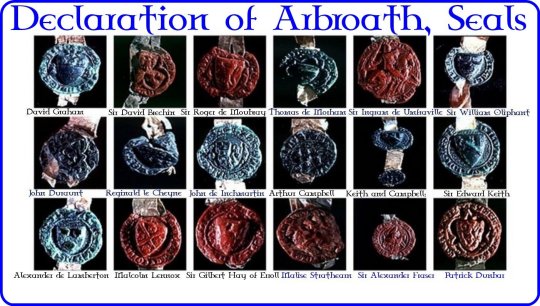
On April 6th 1320, the Declaration of Arbroath was drawn up by the monks of Arbroath Abbey.
Fifty-one Scottish magnates and nobles issued a declaration of Scottish independence in the form of a letter to Pope John XXII. This effort was designed to establish Scotland as an independent kingdom no longer under English rule.
The Declaration of Arbroath is without doubt the most famous document in Scottish history. Like the American Declaration of Independence, which is partially based on it, it is seen by many as the founding document of the Scottish nation.
It was most likely drafted in the scriptorium of Arbroath Abbey by Abbot Bernard on behalf of the nobles and barons of Scotland. It was one of three letters sent to the Pope in Avignon, the other two being from King Robert Bruce himself and from four Scottish bishops, attempting to abate papal hostility. The document received the seals of several Scottish barons and it then was taken to the papal court at Avignon in France by Sir Adam Gordon.
There is considerable debate over the Declaration’s significance. For some it is simply a diplomatic document; while others see it as a radical movement in western constitutional thought.
It could be viewed as a cunning diplomatic ploy by the Scottish barons to explain and justify why they were still fighting their neighbours when all Christian princes were supposed to be united in crusade against the Muslims. All this, just at the point when they were about to retake Berwick: Scotland’s most prosperous medieval town. As an explanation, it failed to convince the pope to lift his sentence of excommunication on Scotland.
Others analyse what the Declaration of Arbroath actually says. The Scots clergy had produced not only one of the most eloquent expressions of nationhood, but the first expression of the idea of a contractual monarchy. Here is the critical passage in question:
‘Yet if he (Bruce) should give up what he has begun, and agree to make us or our kingdom subject to the King of England or the English, we should exert ourselves at once to drive him out as our enemy and a subverter of his own rights and ours, and make some other man who was well able to defend us our King; for, as long as but a hundred of us remain alive, never will we on any conditions be brought under English rule. It is in truth not for glory, nor riches, nor honours that we are fighting, but for freedom - for that alone, which no honest man gives up but with life itself.’
The threat to drive Bruce out if he ever sold Scotland to English rule was a fantastic bluff. There was nobody else to take his place. The point is that the nobles and clergy are not basing their argument to the pope on the traditional notion of the Divine Rights of Kings. Bruce is King first and foremost because the nation chose him, not God, and the nation would just as easily choose another if they were betrayed by the King. The explanation also neatly covers the fact that Bruce had usurped John Balliol’s rightful kingship in the first place.
In spite of all possible motivations for its creation, the Declaration of Arbroath, under the extraordinary circumstances of the Wars of Independence, was a prototype of contractual kingship in Europe.
The pics are the document itself, a re-enactment of the signing from 1957, the statue in Arbroath, a mural at Arbroath train station and a pic I collated of the seals on the document.
27 notes
·
View notes
Text
[The Ten Commandments] are, after all, the only passages in the Bible so profound that the creator of the universe felt the need to physically write them himself and in stone. As such, one would expect these to be the greatest lines ever written, on any subject, in any language. Here they are. Get ready...
You shall have no other gods before me.
You shall not make for yourself a graven image.
You shall not take the name of the LORD your God in vain.
Remember the Sabbath day, to keep it holy.
Honor your father and your mother.
You shall not murder.
You shall not commit adultery.
You shall not steal.
You shall not bear false witness against your neighbor.
You shall not covet your neighbor's house; you shall not covet your neighbor's wife, or his manservant, or his maidservant, or his ox, or his ass, or anything that is your neighbor's.
The first four of these injunctions have nothing whatsoever to do with morality. As stated, they forbid the practice of any non—Judeo-Christian faith (like Hinduism), most religious art, utterances like "God damn it!," and all ordinary work on the Sabbath—all under penalty of death. We might well wonder how vital these precepts are to the maintenance of civilization.
Commandments 5 through 9 do address morality, though it is questionable how many human beings ever honored their parents or abstained from committing murder, adultery, theft, or perjury because of them. Admonishments of this kind are found in virtually every culture throughout recorded history. There is nothing especially compelling about their presentation in the Bible. There are obvious biological reasons why people tend to treat their parents well, and to think badly of murderers, adulterers, thieves, and liars. It is a scientific fact that moral emotions—like a sense of fair play or an abhorrence of cruelty—precede any exposure to scripture. Indeed, studies of primate behavior reveal that these emotions (in some form) precede humanity itself. All of our primate cousins are partial to their own kin and generally intolerant of murder and theft. They tend not to like deception or sexual betrayal much, either. Chimpanzees, especially, display many of the complex social concerns that you would expect to see in our closest relatives in the natural world. It seems rather unlikely, therefore, that the average American will receive necessary moral instruction by seeing these precepts chiseled in marble whenever he enters a courthouse. And what are we to make of the fact that, in bringing his treatise to a close, the creator of our universe could think of no human concerns more pressing and durable than the coveting of servants and livestock?
If we are going to take the God of the Bible seriously, we should admit that He never gives us the freedom to follow the commandments we like and neglect the rest. Nor does He tell us that we can relax the penalties He has imposed for breaking them.
If you think that it would be impossible to improve upon the Ten Commandments as a statement of morality, you really owe it to yourself to read some other scriptures. Once again, we need look no further than the Jains: Mahavira, the Jain patriarch, surpassed the morality of the Bible with a single sentence: "Do not injure, abuse, oppress, enslave, insult, torment, torture, or kill any creature or living being." Imagine how different our world might be if the Bible contained this as its central precept. Christians have abused, oppressed, enslaved, insulted, tormented, tortured, and killed people in the name of God for centuries, on the basis of a theologically defensible reading of the Bible. It is impossible to behave this way by adhering to the principles of Jainism. How, then, can you argue that the Bible provides the clearest statement of morality the world has ever seen?
-- Sam Harris, “Letter To a Christian Nation” (2006)
#Sam Harris#Letter to a Christian Nation#Ten Commandments#christianity#bible#bible study#morality#religious morality#jainism#slavery#religion of slavery#religion#religion is a mental illness
47 notes
·
View notes
Text
I must live through this difficult period in our national history along with the people of Germany. I will have no right to participate in the reconstruction of Christian life in Germany after the war if I do not share the trials of this time with my people … Christians in Germany will have to face the terrible alternative of either willing the defeat of their nation in order that a future Christian civilization may survive, or else willing the victory of their nation and thereby destroying our civilization and any true Christianity. I know which of these alternatives I must choose but I cannot make that choice from a place of security.
Dietrich Bonhoeffer, 1939, in a letter to Reinhold Niebuhr
#much to think about as an American rn...#everyone please go buy one of his books I'm begging you#everyone but especially if you're Lutheran. learn our history. both the horror and the hope
32 notes
·
View notes
Text

Biden reacts to the GOP's proposal to gut social security
* * * * *
LETTERS FROM AN AMERICAN
March 21, 2024
HEATHER COX RICHARDSON
MAR 22, 2024
In the past few weeks, Josh Kovensky of Talking Points Memo has deepened our understanding of the right-wing attempt to impose Christian nationalism on the United States through support for Trump and the MAGA movement. On March 9, Kovensky explored the secret, men-only, right-wing society called the Society for American Civic Renewal (SACR), whose well-positioned, wealthy, white leaders call for instituting white male domination and their version of Christianity in the U.S. after a “regime” change.
On March 19, Kovensky explained how that power was reaching into lawmaking when he reported on a September 2023 speech by Russ Vought, a key architect of the plans for Trump’s second term, including Project 2025. In the speech, which took place in the Dirksen Senate Office Building, Vought explained the right wing’s extreme border policies by explicitly marrying Christian nationalism and an aversion to the pluralism that is a hallmark of American democracy. Vought argued that the U.S. should model immigration on the Bible’s Old Testament, welcoming migrants only “so long as they accepted Israel’s God, laws, and understanding of history.”
These religious appeals against the equality of women and minorities seem an odd juxtaposition to a statement by United Auto Workers (UAW) union president Shawn Fain in response to the claim of the Trump campaign that Trump’s “bloodbath” statement of last Saturday was about the auto industry. Fain is also a self-described Christian, but he rejects the right-wing movement.
“Donald Trump can’t run from the facts,” Fain said in a statement to CBS News. “He can do all the name-calling he wants, but the truth is he is a con man who has been directly part of the problem we have seen over the past 40 years—where working class people have gone backward and billionaires like Donald Trump reap all the benefits….
“Trump has been a player in the class war against the working class for decades, whether screwing workers and small businesses in his dealings, exploiting workers at his Mar a Lago estate and properties, blaming workers for the Great Recession, or giving tax breaks to the rich. The bottom line is Trump only represents the billionaire class and he doesn’t give a damn about the plight of working class people, union or not.”
In the 1850s the United States saw a similar juxtaposition, with elite southern enslavers heightening their insistence that enslavement was sanctioned by God and their warnings that the freedom of Black Americans posed an existential threat to the United States just as white workers were beginning to turn against the system that had concentrated great wealth among a very few men. While white southern leaders were upset by the extraordinary popularity of Harriet Beecher Stowe’s Uncle Tom’s Cabin, the 1852 novel that urged middle-class women to stand up against slavery, it was Hinton Rowan Helper’s 1857 The Impending Crisis of the South: How to Meet It that made them apoplectic.
Hinton Helper was a white southerner himself and showed no abolitionist sympathies in his deeply racist book. What that book did was to show, using the statistics that had recently been made available from the 1850 census, that the American South was falling rapidly behind the North economically. Helper blamed the system of slavery for that economic backwardness, and he urged ordinary white men to overthrow the system of enslavement that served only a few wealthy white men. The cotton boom of the 1850s had created enormous fortunes for a few lucky planters, as well as a market for Helper’s book among poorer white men who had been forced off their land.
White southern elites considered Helper’s book so incendiary that state legislatures made it illegal to possess a copy, people were imprisoned and three allegedly hanged for being found with the book, and a fight over it consumed Congress for two months from December 1859 through January 1860. The determination of southern elites to preserve their power made them redouble their efforts to appeal to voters through religion and racism.
In today’s America, the right wing seems to be echoing its antebellum predecessors. It is attacking women’s rights; diversity, equity, and inclusion programs; immigration; LGBTQ+ rights and so on. At the same time, it continues to push an economic system that has moved as much as $50 trillion from the bottom 90% to the top 10% since 1981 while exploding the annual budget deficit and the national debt.
Yesterday the far-right Republican Study Committee (RSC), which includes about two thirds of all House Republicans, released a 2025 budget plan to stand against Biden’s 2025 budget wish list. The RSC plan calls for dramatic cuts to business regulation, Social Security, Medicaid, and so on, and dismisses Biden’s plan for higher taxes on the wealthy, calling instead for more than $5 trillion in tax cuts. It calls the provision of the Inflation Reduction Act that permits the government to negotiate with pharmaceutical companies over prices “socialist price controls.”
Biden responded to the RSC budget, saying: “My budget represents a different future. One where the days of trickle-down economics are over and the wealthy and biggest corporations no longer get all the breaks. A future where we restore the right to choose and protect other freedoms, not take them away. A future where the middle class finally has a fair shot, and we protect Social Security so the working people who built this country can retire with dignity. I see a future for all Americans and I will never stop fighting for that future.”
Biden’s version of America has built a strong economy in the last two years, with extremely low unemployment, extraordinary growth, and real wage increases for all but the top 20%. Inequality has decreased. Today the White House announced the cancellation of nearly $6 billion in federal student loan debt for thousands of teachers, firefighters, and nurses. Simply by enforcing laws already on the books that allow debt forgiveness for borrowers who go into public service, the administration has erased nearly $144 billion of debt for about 4 million borrowers.
At the same time, the administration has reined in corporations. Today the Department of Justice, along with 15 states and the District of Columbia, sued Apple, Inc., for violating the 1890 Sherman Antitrust Act. They charge that the company, which in 2023 had net revenues of $383 billion and a net income of $97 billion, has illegally established a monopoly over the smartphone market to extract as much revenue as possible from consumers. The company’s behavior also hurts developers, the Department of Justice says, because they cannot compete under the rules that Apple has set.
At the end of February, the Federal Trade Commission (FTC) sued to block the merger of Kroger and Albertsons, a $24.6 billion takeover affecting 5,000 supermarkets and 700,000 workers across 48 states. The merger would raise grocery prices, narrow consumer choice, and hurt workers’ bargaining power, the FTC said. The attorneys general of Arizona, California, the District of Columbia, Illinois, Maryland, Nevada, New Mexico, Oregon and Wyoming joined the FTC’s lawsuit.
The benefits of the administration’s reworking of the government for ordinary Americans have not gotten traction in the past few years, as right-wing media have continued to insist that Biden’s policies will destroy the economy. But as Shawn Fain’s position suggests, ordinary white men, who fueled the Reagan Revolution in 1980 when they turned against the Democrats and who have made up a key part of the Republican base, might be paying attention.
In June 2023 the AFL-CIO, a union with more than 12.5 million members, endorsed Biden for president in 2024 in its earliest endorsement ever. In January the UAW also endorsed Biden. Yesterday the United Steelworkers Union, which represents 850,000 workers in metals, mining, rubber, and other industries, added their endorsement.
Just as it was in the 1850s, the right-wing emphasis on religion and opposition to a modern multicultural America today is deeply entwined with preserving an economic power structure that has benefited a small minority. That emphasis is growing stronger in the face of the administration’s effort to restore a level economic playing field. In the 1850s, those who opposed the domination of elite enslavers could only promise voters a better future. But in 2024, the success of Biden’s policies may be changing the game.
LETTERS FROM AN AMERICAN
HEATHER COX RICHARDSON
#Biden#Biden White House#Social Security#GOP Budget#RSC#Republican Study Committee#Christian Nationalism#AFL-CIO#unions#antebellum american#history#Heather Cox Richardson#Letters From An American#ACSR#American Civic Renewal#Project 2025
4 notes
·
View notes
Text
In Subcontractors of Guilt: Holocaust Memory and Muslim Belonging in Postwar Germany, Esra Özyürek describes the way that German politicians, officials and journalists, now that the far right is in the ascendant, have been cranking up the old mechanism of sanitising Germany by demonising Muslims. In December 2022, German police foiled a coup attempt by Reichsbürger, an extremist group with more than twenty thousand members, which was planning an assault on the Bundestag. Alternative für Deutschland, which has neo-Nazi affiliations, has become the country’s second most popular party, partly in response to economic mismanagement by the coalition led by Olaf Scholz. Yet despite the undisguised antisemitism of even mainstream politicians such as Hubert Aiwanger, the deputy minister-president of Bavaria, ‘white Christian-background Germans’ see themselves ‘as having reached their destination of redemption and re-democratisation’, according to Özyürek. The ‘general German social problem of antisemitism’ is projected onto a minority of Arab immigrants, who are then further stigmatised as ‘the most unrepentant antisemites’ in need of ‘additional education and disciplining’.
...
Netanyahu, too, has learned from Germany’s postwar efforts at whitewashing. In 2015 he claimed that the Grand Mufti of Jerusalem had persuaded Hitler to murder rather than simply expel the Jews. Three years later, after initially criticising a move by the Law and Justice Party in Poland to criminalise references to Polish collaboration, he endorsed the law making such references punishable by a fine. He has since legitimised Shoah revisionism in Lithuania and Hungary, commending both countries for their valiant struggle against antisemitism. (Efraim Zuroff, a historian who has helped bring many former Nazis to trial, compared this to ‘praising the Ku Klux Klan for improving racial relations in the South’.) More recently, Netanyahu accompanied Elon Musk to one of the kibbutzim targeted by Hamas, just days after Musk tweeted in support of an antisemitic conspiracy theory. Since 7 October, he has seemed to be reading from the Eichmann trial script. He regularly announces that he is fighting the ‘new Nazis’ in Gaza in order to save ‘Western civilisation’, while others in his cohort of Jewish supremacists keep up a supporting chorus. The people of Gaza are ‘subhuman’, ‘animals’, ‘Nazis’.
...
In a more unnerving illustration of the postwar German-Israeli symbiosis, the German health minister, Karl Lauterbach, approvingly retweeted a video in which Douglas Murray, a mouthpiece of the English far right, claims that the Nazis were more decent than Hamas. ‘Watch and listen,’ retweeted Karin Prien, deputy chair of the Christian Democratic Union and education minister for Schleswig-Holstein. ‘This is great,’ Jan Fleischhauer, a former contributing editor at Der Spiegel, wrote. ‘Really great,’ echoed Veronika Grimm, a member of the German Council of Economic Experts. The Süddeutsche Zeitung, which in 2021 ‘outed’ five Lebanese and Palestinian journalists at Deutsche Welle as antisemites, with equally flimsy evidence exposed the Indian poet and art historian Ranjit Hoskote as a calumniator of Jews for comparing Zionism with Hindu nationalism. Die Zeit alerted German readers to another moral outrage: ‘Greta Thunberg openly sympathises with the Palestinians.’ An open letter from Adam Tooze, Samuel Moyn and other academics criticising Jürgen Habermas’s statement in support of Israel’s actions provoked an editor at the Frankfurter Allgemeine Zeitung to claim that Jews have an ‘enemy’ at universities in the form of postcolonial studies. Der Spiegel ran a cover picture of Scholz alongside his claim that ‘we need to deport on a grand scale again.’
...
Susan Neiman, who wrote admiringly of Vergangenheitsbewältigung in Learning from the Germans (2020), now says she has changed her mind. ‘German historical reckoning has gone haywire,’ she wrote in October. ‘This philosemitic fury ... has been used to attack Jews in Germany.’ In Never Again: Germans and Genocide after the Holocaust, which examines the German response to mass killings in Cambodia, Rwanda and the Balkans, Andrew Port suggests that their ‘otherwise admirable reckoning with the Holocaust may have unwittingly desensitised Germans. The conviction that they had left the rabid racism of their forebears far behind them may have paradoxically allowed for the unabashed expression of different forms of racism.’
(source)
42 notes
·
View notes
Text
Real talk: i have been pretty absent from this blog (i wouldn't say slacking necessarily because it is first and foremost a hobby, a means of communication second, and i do not consider it a job to any degree). Do not worry, nothing bad has happened, and a big part of it is rediscovering my love of literature. Got my hands on a copy of Thomas Kinsella's The Táin, read The Handmaid's Tale, and recently finished Ivanhoe through audiobook.
I've already been singing the praises of the Táin Bó Cúailnge so i'll spare you having to read through that gushing. Ivanhoe is incredible and shockingly sensitive on the topic of antisemitism for something written by an early 19th century Christian author intended for a majority Christian audience. The scenes with Robin Hood also filled me with a childish glee and i think it was suppose to be a surprise that this guy is Robin Hood but he introduces himself as Locksley and wins an archery contest and leads a gang of outlaws in the woods, including a hermit who refers to Alan-a-Dale quite a bit so it's very obvious to a modern reader. Handmaid's Tale was also as good as i've heard it was, but there's a specific detail i want to discuss that feels relevant to how i think of this blog and how others use it.
I've read the reviews and the plot synopses amd analyses, i knew about the epilogue that frames the story as a historical document a century or so in the future. This did not surprise me. What did catch me by surprise, and something i feel is entirely overlooked, is that this story of an oppressive theocratic regime that uses Biblical precedence to excuse extreme atrocities of human rights violations and turned out to not even last very long, is contextualized as the topic of a discussion hosted by First Nations academics who study white people cultures. You can be pedantic and say "oh but technically they're only First Nations coded because it's presented as a transcript with no physical descriptions" and to a degree you would be right; but when you see names like Maryann Crescent Moon and Johnny Running Dog used for professors of a University of Denay (an anglo-phonetic spelling of Diné/Dene) in Nunavit, there isn't much room for speculating what ethnicity they're supposed to be.
There are so many little details in the book referencing Indigenous genocide. Details suggesting forms of genocide Atwood would be familiar with as a Canadian citizen. To only bring up religious fanaticism and patriarchal regressive politics in Middle Eastern nations like Iran and Afghanistan as well as the United States as inspirations for a surface level five minute summary is one thing, but to ignore all the anti-Indigenous policies that are also obvious inspirations (literally just read the passages about how the Narrator/Offred's daughter was taken from her, renamed, and given to a "proper home" to get what i mean, it's that blatant) when the iconic epilogue makes it as explicit as it can be without writing "THESE ARE NATIVE ISSUES" in big red letters? I won't lie to you, it feels like a slap to the face. Especially when the take away message of such a conclusion seems to be that Native peoples will outlive these regimes.
#other interests#the handmaid's tale#ivanhoe#the táin#thus concludes Mostly Mundane's Angry Native Literary Analysis Corner
72 notes
·
View notes